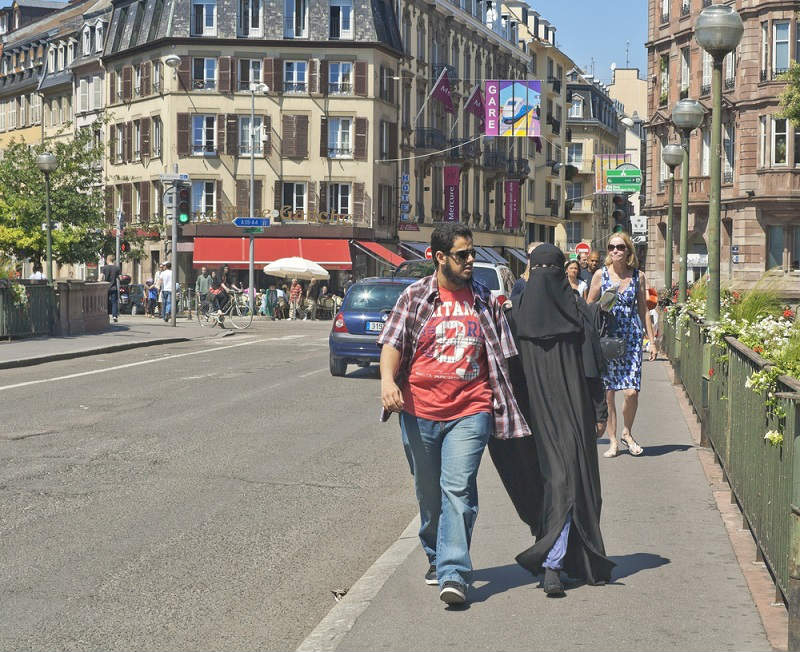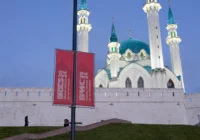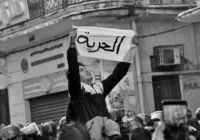Western democracy and Islam must find ways to exist together peacefully — especially in France.
Dust may have settled since the Paris attacks of January 7-9, but the debate over freedom of expression goes on. In the aftermath of the horrific murders, one key issue remains: freedom of expression vs religious conservatism. The Charlie Hebdo attacks were not the first time that Islamist extremists have taken innocent lives in the name of blasphemy. But is Islam at odds with Western liberalism?
The objective of a dogmatic religion, including Judaism, Christianity and Islam, is primarily to bind a society in a moral fabric. When a religious thought or ideology attains the intellectual underpinning of binding a society through moral thread, it develops an authority to dictate a law over its ruled people. Any idea that rules over people naturally becomes political. A religion that rules over its believers behaves like a concept with a political motive of conquering another territory to expand its influence. As a political entity sees any other organization with the same motive as its threat, a dogmatic religion guards its sovereignty very fiercely vis-à-vis any other religious faction. Thus, religion is a political idea that does not like to be subjugated by any other rival thought and wants to conquer other territories as well.
The strength and resilience of religion is beyond imagination: Nation-states can rise and fall, but religion remains unaltered and unharmed with its perpetual existence. But modern societies are governed through a model of nation-state.
Especially in the West, this concept has matured with democracy. It does not mean that during the Middle Ages religion was not an influencing force in Western society. In fact, the significance of religion in the West continued to be vilified by many political and social movements. Western civilization became enriched by movements, revolutions and ideologies like Italian renaissance, French enlightenment and British Magna Carta. It took the West centuries to prepare a ground where an individual was considered the center of all imagination rather than the church.
If you analyze the political and economic history of Europe, it will lead you to think that two human geniuses, Karl Marx and Adam Smith, changed Western thought forever when it came to dealing with the influence of religion on the human mind. Marx unequivocally criticized religion as unaccountable authority interfering in society. Smith relied on individual power for wealth creation as opposed to a centralized state. In both ways, the logic of democracy coupled with socialism or capitalism convinced Westerners that, in order to lead a happy and meaningful life, one does not need to make an appointment with a priest to seek any divine intervention.
But, after all, the West is not the only part of the world. In Muslim-majority countries, Islam as a faith plays a huge role in society. Islam is probably the only religion that has the ability to resist democracy. What makes Islam so powerful is that it can stand as an antagonistic force vis-à-vis the idea of democracy, which rests on values like tolerance and freedom of expression.
Political Islam Refuses democracy
Historical analysis of Islam tells that Prophet Muhammad was not just a spiritual teacher, but also a ruler of his tribal community, which means he acted as a head of state as well. In Christianity, Jesus was only a preacher, while in Buddhism, Gautam Buddha was a teacher and philosopher enlightening society with the theory of “nothingness.” Not even that, if we look at Islamic history, we find that only in Islam the founder himself conquered territory and set out to convert neighboring communities. History tells that all that converting other communities into Islam was through sheer bloodshed, not peaceful preaching — particularly in northern India.
Observers note that Islam sees itself as the only pure faith that exists. Anything that is not Islamic is considered impure. Not even that, it is the duty of Muslims to convert others of impure faith into Islam. From the early phase of its birth, Islam developed a unipolar, prejudiced view of seeing the world — in other words, you’re either with us or against us.
Although there are differences across the globe, Muslim countries often have an old habit of flirting with the theocratic nature of the state. On one hand, Saudi Arabia is the representative state of theocracy. On the other, there are several countries across the Middle East, North Africa and Asia where religion runs the show of power under the veil of farcical democracy or even so-called secularism.
In such states, the religious heads get the legitimate right to rule. Sharia, or Islamic law, becomes the pivot of all political and social institutions. As per sharia, it is Allah who is the supreme sovereign rather than the people. Whether in public or private, Islamic law encompasses all aspects of life: from politics and finance to health and hygiene.
So, a religious tradition of this nature will stand firmly antagonistic to democracy. After all, in democracy, the citizen is made the custodian of power, not any “divine” agency represented by a priest, rabbi or sheikh.
These two antagonistic ideas — democracy and Islam — have been in closer contact since the 20th century. With mass immigration following World War II due to a labor deficit, the staging ground of this became Europe. The aim of multiculturalism tested the established value system of secularism of those developed democracies. Among other Western countries, France presents a curious example of democracy with non-reformist Islam.
Is France in a Conflict With Islam?
France holds its democratic values of liberty, equality and fraternity close to its heart. But when it comes to the interaction of religion with society, the uniqueness of France appears evident from its European neighbors. France is not just any other country of western Europe when it comes to interaction with religion; it is not like Italy where Catholicism plays an important role due to the pope, nor is it like Britain where the Church of England enjoys an affiliation with the crown.
Since Enlightenment, French thinkers advocated for a total separation of state from church, which went on to form French secularism known as laïcité. In secular France, religion was considered an obstacle in building a modern society. Thus, faith was reduced to a personal matter. The French consider the quasi extinction of religion from their society as a symbol of the triumph of individualism and modernity.
Christianity was accommodated and pacified within French society over the years. The attribute for this assimilation goes to the intellectual enlightenment, industrialization and colonization. The politics of Christianity became mollified by the politics of European nationalism, socialism and capitalism.
But Islam, which traveled to France though the people of former colonies, could not create a place of peaceful cohabitation for three reasons. First, it came from foreign land external to Europe. Second, France’s rigid culture of secularism sees Islam under negative sheds. And third, whether people like it or not, the seed of France’s turbulent relations with Islam lies in its colonial past.
According to Michel Tribalat, a researcher at INED, people of North African (Maghreb) descent in France represent 82% of the Muslim population. That means the majority of French Muslims living in France are of Algerian origin.
French history is scarred with the Algerian War of 1954-62. The wounds of that infamous conflict may have healed, but the distrust and hatred still remain in the minds of French Algerians toward the state. In fact, despite living in France for many years, citizens of Algerian origin often identify themselves as Muslims first and then Algerian. The French identity does not offer any emotional connection to them.
Let’s remind ourselves that in the case of the Paris attacks, two out of the three terrorists were French citizens of Algerian origin. Relations between France and Algeria still remain strained. Surprisingly, not many efforts have been made to mend ties between the former colonizer and the colonized.
It is true that the presence of Islam challenges the fundamentals of democracy. This challenge could become a crisis as the Charlie Hebdo case shows. If French democracy wants to win, then it has to show flexibility, accommodation and inclusion of those who were left behind on the path of progress. French intellectuals should realize that the republican form of the state has failed to make France a truly multicultural society.
We bring you perspectives from around the world. Help us to inform and educate. Your donation is tax-deductible. Join over 400 people to become a donor or you could choose to be a sponsor.
The views expressed in this article are the author’s own and do not necessarily reflect Fair Observer’s editorial policy.
Photo Credit: Arenysam / Walencienne / Shutterstock.com
Support Fair Observer
We rely on your support for our independence, diversity and quality.
For more than 10 years, Fair Observer has been free, fair and independent. No billionaire owns us, no advertisers control us. We are a reader-supported nonprofit. Unlike many other publications, we keep our content free for readers regardless of where they live or whether they can afford to pay. We have no paywalls and no ads.
In the post-truth era of fake news, echo chambers and filter bubbles, we publish a plurality of perspectives from around the world. Anyone can publish with us, but everyone goes through a rigorous editorial process. So, you get fact-checked, well-reasoned content instead of noise.
We publish 2,500+ voices from 90+ countries. We also conduct education and training programs
on subjects ranging from digital media and journalism to writing and critical thinking. This
doesn’t come cheap. Servers, editors, trainers and web developers cost
money.
Please consider supporting us on a regular basis as a recurring donor or a
sustaining member.
Will you support FO’s journalism?
We rely on your support for our independence, diversity and quality.








Comment
If you have any questions or want to learn the truth about Islam, you can visit
Hello Ajitabh,
I do not want to comment on your analysis of Charlie Hebdo. But what I infact found interesting was the use of “religion”.
The biggest problem here is the idea of what religion means tends to vary from person to person. There are multi-interpretations of religion.
The most widely held perception is a belief in superhuman existence and a controlling power or simply put God. Some people say religion existed because humans are a mix of preachers and followers. Religion is an inherited liability, inherited from ancestors/preachers who wanted others to believe in what they believed. Apparently, religion is written/made/preached/believed/followed by humans. A few other people also believe that religion is a traditional text that consisted of day-to-day experiences that were made rules of thumb. It is nothing but a documented scripture consisting of some learnings/findings just like how a scientist documents his/her findings in journals.
Unfortunately, religious texts describing a community’s belief have greatly been amended by nobody knows how/whom that every life lesson documented is related to God’s existence. The original purpose of religion was to guide man in every step of his life but its ideals have been completely distorted by opportunists. What we now have instead is a dogmatic rulebook of blind faith, intimidating myths and a ritualistic lifestyle.
What is even more sad is generalizing and assuming that a “religion’s belief” is also the belief of its community. “Religion” has taken more lives than any other war ever.